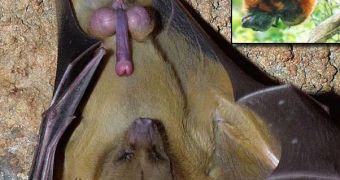Scientists couldn't find out if vampire bats can feed on their own blood, but what they did discover is that bats can have a menstrual cycle. At least in the case of a species of fruit bat.
The Chinese research team, led by Professor Shuyi Zhang of East China Normal University, and Hongmei Wang of the Institute of Zoology, Chinese Academy of Sciences, pointed out that their findings could lead to bats being investigated by researchers who study the human menstrual problems and other reproductive disorders.
The team made the discovery in the Leschenault's rousette bat (Rousettus leschenaulti) which inhabit caves, wells and mines in South and Southeastern Asia, from Pakistan to Indochina and Java. The rousette bats are more peculiar amongst the other fruit bats (Megachiroptera "large bats"), as they possess echolocation through ultrasounds, like the rest of the bats included in Microchiroptera ("small bats"), detect less colors than other fruit bats and some times indulge in animal meals (like snails).
To be sure of their findings, the team brought on board Professor Paul Racey of the University of Aberdeen, a world leading researcher of bats and their reproductive biology. "Although it occurs in primates, menstruation is found in few of the world's 4,000 species of mammals which is why this discovery is so remarkable. The finding is significant because it extends our knowledge of the reproductive biology of what is a large group of mammals. It also raises the possibility that this type of fruit bat could be studied by those who are trying to increase our understanding of human menstrual dysfunction and other reproductive disorders.", he said.
Fruit bats live in tropical and subtropical climates, with more or less constant temperatures; this is less likely in temperate climate bats, with a more seasonal reproduction pattern.
And as the vampires are Microchiroptera, we can barely wait for the answer?

 14 DAY TRIAL //
14 DAY TRIAL //